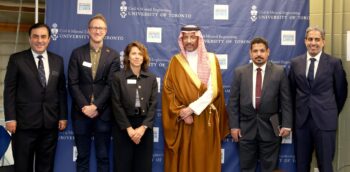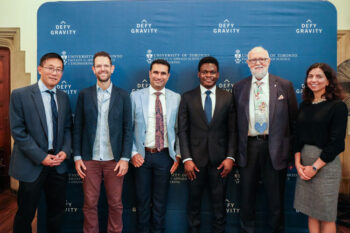The University of Toronto hosted Canada’s top schools at the first-ever Engineering Graduate Studies Fair on October 2.
Earlier this year, U of T Engineering partnered with engineering faculties at four other Canadian schools: University of Alberta, University of British Columbia, McGill University and the University of Waterloo, to form the Canadian Graduate Engineering Consortium.
The Consortium is collaborating on a series of graduate recruiting events at each member campus to attract the very best engineering students across the country.
The Fair, organized by Laura DeBartolo, Faculty Research & Graduate Coordinator, included an information session, an open-panel discussion and a networking reception at the Bahen Centre for Information Technology. More than 200 students were in attendance, taking the opportunity to have informal conversations with U of T Engineering professors and current graduate students about their experiences, their cutting-edge research and potential degree options, as well as discover the opportunities available at other Consortium-member faculties.
“Many students see graduate work as the first step in a career in academia,” said Professor Markus Bussmann (MIE), Vice-Dean, Graduate Studies. “While that is one noble ambition, we also want to highlight the other excellent career paths that could benefit from a master’s or a PhD, as well as the industry and leadership opportunities graduate study at U of T can provide.”
Armed with brochures and pamphlets from the information session, students filed into the Adel S. Sedra Auditorium to hear a panel discussion on innovative engineering research and the need for specialized skills within the Canadian industry.
The panel featured Professor Craig Simmons (MIE, IBBME), Hatch engineers Dr. Kinnor Chattopadhyay and Dr. Ghazaleh Nazari, as well as Telus’ Dr. Tim Poon and Waterloo Dean of Engineering Pearl Sullivan.
They discussed their personal and professional experiences with graduate programs, emphasizing the need for continued research and discovery, while highlighting the executive options graduate study makes available.
They then answered questions from students about the right time to pursue graduate work, the expectations across the various programs, and the benefits of having a graduate degree when it comes to the workforce.
“Graduate work really helps to develop and hone professional skills like project management, scientific writing and presenting,” said Professor Simmons, the Canada Research Chair in Mechanobiology, and an award winner in both research and teaching. “Those skills translate across all fields of engineering and help you address all challenges, even if they’re outside your area of study.”
Professor Simmons underscored the importance of taking advantage of other university programs offered during graduate study that can help complement students’ research. Those include the graduate leadership and certificate courses offered at U of T Engineering through ILead or business experience gained through work at The Entrepreneurship Hatchery.
After the panel discussion students were invited to a networking reception back in the Bahen atrium where they could discuss what they had learned and connect with industry officials to further discuss the advantages of a graduate degree in the workplace.
“We are very pleased with the response to tonight’s event and very thankful to our panelists and participants,” said Professor Bussmann. “We look forward to continuing to engage prospective graduate students and promoting U of T Engineering’s graduate programs in this world-class city to our students and those across Canada and around the world.”



